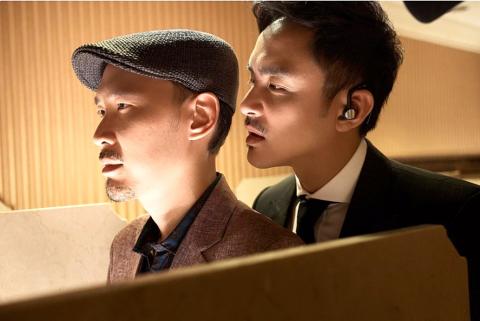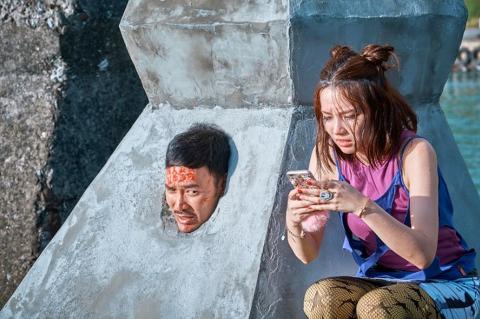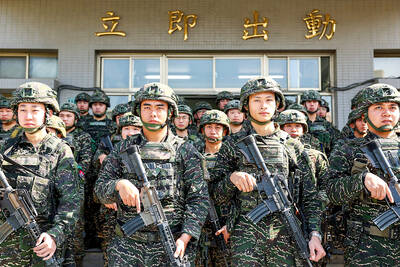It’s not every day that you have a film where it’s actually appropriate for the characters to repeatedly flip the bird at the camera during the closing credits, but that pretty much sums up the experience of Let’s Cheat Together (市長夫人的秘密): to hell with politics.
Uttered by protagonist Sleuth “Love Master” Cheng (張少懷, Michael Chang) a fake-mustache wearing Jerry Springer-style love show host, the line “politics and love are essentially the same, both are clever trickery” sums up this hilariously dark parody of pretty much everything in Taiwan. The characters are mostly based in reality but do not refer to a specific person: they are caricatures of the phony cesspool of political maneuvers and shameless vote-mongering that make up the twisted political world that everyone in Taiwan loves to hate, or perhaps the other way around.
Taipei Mayor Earnest Yang (Umin Boya), is a prime example. The city’s first Aboriginal mayor is many former mayors rolled into one. Yang is handsome and charismatic (Ma Ying-jeou, 馬英九), a doctor-turned-politician (Ko Wen-je, 柯文哲), begins his public addresses by greeting the audience in Mandarin, Hoklo (also known as Taiwanese), Hakka and a number of Aboriginal and foreign languages (Chen Shui-bian, 陳水扁) who was elected after a possibly self-orchestrated assassination attempt (also Chen).

Photo courtesy of atmovies.com
Throw in a Zen master with a massive following who takes “breaks” from his silent meditation to host political weddings and the mayor’s wife Liao Yen-ling (Joe Chen, 陳喬恩), who hails from a rich business family with a history of political marriages and has to fake her interests to appeal to voters, all the ingredients are there for a fun ride. It also pokes fun at all manner of Taiwanese social phenomena and recent events, and is a universal enough story that, even if you don’t get all the references, is uniquely Taiwanese and does not try to mimic anybody else.
The only thing saucier is when these politicians get involved in sex scandals (it’s just a kiss scandal here as this is Taiwan, where movies are usually pretty PG), and as love and politics become intertwined the story only gets funnier and more interesting.
The film opens in dramatic fashion, with Sleuth calling out to a heartbroken girl for help. The love show host is stuck in a concrete tetrapod with red characters printed on his forehead accusing him of sleeping with the mayor’s wife. Of course, instead of notifying the police, the girl snaps a selfie with the celebrity. Meanwhile, the entire nation closely follows the ensuing news reports by an anchor named “Apple,” who takes sensationalism and asking idiotic questions to a new level.

Photo courtesy of atmovies.com
That sets the tone for the rest of the film, with Sleuth’s angry girlfriend and manager Miu Miu (Alice Ko, 柯佳嬿) delivering a strong performance as a serious, no-nonsense micromanager who keeps things from going out of control. Rounding out the main cast is Confidential Liu (Ming Dao, 明道), a double or even triple agent who sets the events in motion. With his lowbrow shenanigans, Liu’s performance is a bit over the top, and given the outrageousness of everything that’s already going on, is a bit of overkill even for a movie like this. Chang falls somewhere in between, but he is perfectly suited for his role, delivering a memorable performance as a pathetic funnyman.
Everyone becomes a little bit of Sherlock Holmes throughout the film, as they use their observational skills (especially Sleuth, who’s secretly a mystery novel author) to try and uncover the truth — only to find that the truth is not what it appears to be and there’s a motive beneath every motive. It’s almost like what last year’s wildly successful The Bold, Beautiful and Corrupt (血觀音) would have been if it didn’t take itself seriously and drenched itself in modern pop culture.
While the storytelling, acting and suspense in Let’s Cheat Together does not come close to the multiple Golden Horse-winning The Bold, Beautiful and Corrupt, it’s still a strong showing that touches on similar themes in a much more light-hearted and family-friendly way.
Selected as the closing film for last month’s Golden Horse Film Festival, Let’s Cheat Together will probably win some of its own down the road.

That US assistance was a model for Taiwan’s spectacular development success was early recognized by policymakers and analysts. In a report to the US Congress for the fiscal year 1962, former President John F. Kennedy noted Taiwan’s “rapid economic growth,” was “producing a substantial net gain in living.” Kennedy had a stake in Taiwan’s achievements and the US’ official development assistance (ODA) in general: In September 1961, his entreaty to make the 1960s a “decade of development,” and an accompanying proposal for dedicated legislation to this end, had been formalized by congressional passage of the Foreign Assistance Act. Two

Despite the intense sunshine, we were hardly breaking a sweat as we cruised along the flat, dedicated bike lane, well protected from the heat by a canopy of trees. The electric assist on the bikes likely made a difference, too. Far removed from the bustle and noise of the Taichung traffic, we admired the serene rural scenery, making our way over rivers, alongside rice paddies and through pear orchards. Our route for the day covered two bike paths that connect in Fengyuan District (豐原) and are best done together. The Hou-Feng Bike Path (后豐鐵馬道) runs southward from Houli District (后里) while the

President William Lai’s (賴清德) March 13 national security speech marked a turning point. He signaled that the government was finally getting serious about a whole-of-society approach to defending the nation. The presidential office summarized his speech succinctly: “President Lai introduced 17 major strategies to respond to five major national security and united front threats Taiwan now faces: China’s threat to national sovereignty, its threats from infiltration and espionage activities targeting Taiwan’s military, its threats aimed at obscuring the national identity of the people of Taiwan, its threats from united front infiltration into Taiwanese society through cross-strait exchanges, and its threats from

March 31 to April 6 On May 13, 1950, National Taiwan University Hospital otolaryngologist Su You-peng (蘇友鵬) was summoned to the director’s office. He thought someone had complained about him practicing the violin at night, but when he entered the room, he knew something was terribly wrong. He saw several burly men who appeared to be government secret agents, and three other resident doctors: internist Hsu Chiang (許強), dermatologist Hu Pao-chen (胡寶珍) and ophthalmologist Hu Hsin-lin (胡鑫麟). They were handcuffed, herded onto two jeeps and taken to the Secrecy Bureau (保密局) for questioning. Su was still in his doctor’s robes at